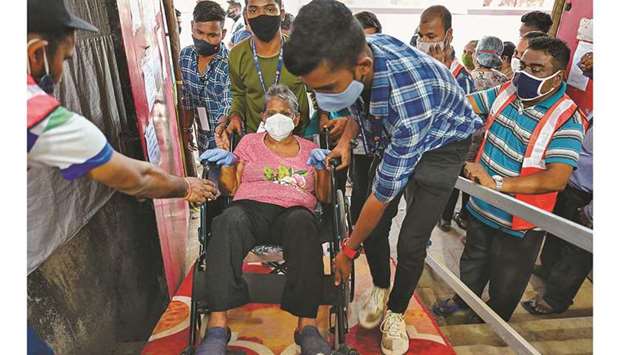India’s coronavirus death toll crossed 250,000 yesterday in the deadliest 24 hours since the pandemic began, as the disease rampaged through the countryside, leaving families to weep over the dead in rural hospitals or camp in wards to tend the sick.
Boosted by highly infectious variants, the second wave erupted in February to inundate hospitals and medical staff, as well as crematoriums and mortuaries.
Experts still cannot say for sure when the figures will peak.
Indian state leaders clamoured for vaccines to stop the second wave and the devastation that it has wrought, urging Prime Minister Narendra Modi to stop exporting vaccines, ramp up production and help them procure urgent supplies from overseas.
“People will die in the same way in the third and fourth waves as they have this time” without more vaccines, Delhi’s Deputy Chief Minister Manish Sisodia told reporters.
Deaths grew by a record 4,205 while infections rose 348,421 in the 24 hours to yesterday, taking the tally past 23mn, health ministry data showed.
Experts believe the actual numbers could be five to 10 times higher.
Funeral pyres have blazed in city parking lots, and bodies have washed up on the banks of the river Ganges, immersed by relatives whose villages were stripped bare of the wood needed for cremations.
Lacking beds, drugs and oxygen, many hospitals in the world’s second-most populous nation have been forced to turn away droves of sufferers.
“We seem to be plateauing around 400,000 cases a day,” the Indian Express newspaper quoted virologist Shahid Jameel as saying. “It is still too early to say whether we have reached the peak.”
India is using the AstraZeneca vaccine made at the Serum Institute in the western city of Pune and Covaxin by Bharat Biotech but has fully vaccinated barely 2.5% of the population.
Indians need vaccines “here and now”, the chief minister of West Bengal state, Mamata Banerjee, said in a letter to Modi.
The country accounts for half of Covid-19 cases and 30% of deaths worldwide, the World Health Organisation said in its latest weekly report.
The full impact of the B.1.617 variant found in India, which the WHO has designated as being of global concern, is not yet clear, it added.
The variant has been detected in six countries in the Americas, the Pan American Health Organisation said, adding that it was worried that it was highly transmissible.
Daily infections are shooting up in the Indian countryside in comparison to big towns, where they have slowed after last month’s surge, experts say.
More than half the cases this week in the western state of Maharashtra were in rural areas, up from a third a month ago.
That share is nearly two-thirds in the most populous, and mainly rural, state of Uttar Pradesh, government data showed.
Television showed images of people weeping over the bodies of loved ones in ramshackle rural hospitals while others camped in wards tending to the sick.

Volunteers help elderly women to reach the vaccination centre to get inoculated with the Covid-19 vaccine in Mumbai.
